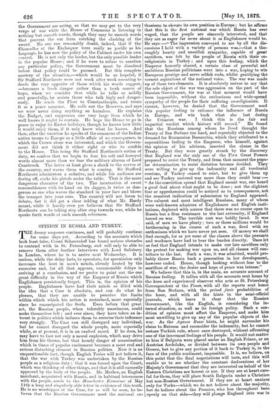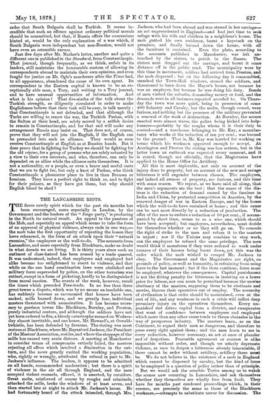OPINION IN RUSSIA AND TURKEY.
THE dreary suspense continues, and will probably continue for some days yet. According to the accounts which look least false, Count Schouvaloff has found serious obstacles to contend with in St. Petersburg, and will only be able to remove them after further interviews with Lord Salisbury in London, where he is to arrive next Wednesday. It is useless, while the delay lasts, to speculate, for speculation only increases the heat in men's minds, already heated by the excessive and, for all that appears, unreasonable delays in arriving at a conclusion, and we prefer to point out the one great difficulty in the way of the Emperor of Russia which Englishmen persistently forget. This is, the opinion of his people. Englishmen have had their minds so filled with the idea that a Czar is absolute, and can do what he pleases, that they are unable to perceive the limits within which which his action is restrained, more especially since he emancipated the Serfs. Even before that great act, the Russian people, when tolerably unanimous, could make themselves felt ; and ever since, they have taken an in- terest in polities which induces them to exercise their influence very strongly. The Czar can still disregard any individual, but he cannot disregard the whole people, more especially while, as at present, it is in an exalted mood. If he does, he. may have to face not only a moral explosion, which may drive him from his throne, but that hourly danger of assassination which in times of popular excitement becomes a most real and serious disturbing element in Russian politics. Now it is an unquestionable fact, though English Tories will not believe it, that the war with Turkey was undertaken by the Russian people as a religious duty ; that it was forced upon the Court, which was thinking of other things, and that it is still earnestly approved by the body of the people. Mr. Mather, an English merchant, acquainted with Russia, and in habitual intercourse with the people, sends to the Manchester Examiner of May 11th a long and singularly able letter in evidence of this truth. He is no worshipper of the Czar, for as will be seen, he be- lieves that the Russian Government used the national en- thusiasm to elevate its own position in Europe ; but he Affirms that this is the first national war which Russia has over waged, that the people are sincerely interested, and that they are as eager for news about it as Englishmen would be. He says :—" The impression conveyed to me by all the dis- cussions I held with a variety of persons was,—that a tho- roughly hearty and unselfish sympathy, capable of great sacrifices, was felt by the people of Russia with their (*- religionists in Turkey ; and upon this feeling, which the Emperor honestly shared, a certain class of powerful and ambitious Russian politicians went into a war, hoping to win European prestige and serve selfish ends, whilst gratifying the earnest aspirations of the national voice. The war was made -up of these two elements. It is absolutely untrue to say that the sole object of the war was aggression on the part of the Russian Government, for war at that moment would have been impossible, without the enthusiasm and wide-spread sympathy of the people for their suffering co-religionists. It cannot, however, be denied that the Government used this popular feeling to enhance the influence of Russia in Europe, and win back what she lost during the Crimean war. I think this is the fair and impartial verdict which history will record." He found that the Russians among whom he lived thought the Treaty of San Stefano too hard, and especially objected to the demand for Roumanian Bessarabia, which they attributed to a superstitious feeling in the Emperor, who himself, against the opinion of his advisers, inserted the clause in the Treaty. But they were greatly struck by the discovery that England was the only one of the Five Great Powers prepared to resist the Treaty, and from that moment the popu- lar determination to resist dictation became decided. They were willing to give up the indemnity and all territorial cessions, if Turkey ceased to exist, but to give them up and see Turkey restored was more than they could bear:— "As the conviction spread that England meant war, one heard a good deal about what ought to be done ; not the slightest fear or apprehension could be noticed as to consequences, not the remotest indication of submission to England appeared. The calmest and most intelligent Russians, many of whom were well-known admirers of Englishmen and English insti- tutions, deplored with sorrow that there was no course open to Russia but a firm resistance to the last extremity, if England forced on war. The terrible cost was boldly faced. It was said, of men we have plenty ; two or three millions would be forthcoming in the course of such a war, fired with an enthusiasm which we have never yet seen. Of money we shall find enough, for as yet none of the classes above the peasants and workmen have had to bear the burden directly. Once let us feel that England intends to make our late sacrifices only the pretext for making war upon us, and all classes will con- tribute to the last. Such a war, it was admitted, would pro- bably throw Russia back a generation in her development, however ended. Hence, though looking without fear to the sacrifices of war, the desire and hope of peace was intense."
We believe that this is, in the main, an accurate account of Russian feeling. It tallies with all the accounts sent home by the keen and experienced observer who acts as St. Petersburg Correspondent of the Times, with all the reports sent home from San Stefano, with the prima fade probabilities of the hour, and with all the hints in the semi-official journals, which leave it clear that the Russian Government, like the English, is considering the in- ternal situation, as well as its foreign policy. Such a con- dition of opinion must affect the Emperor, and make him most unwilling to give up any of the popular objects of the war. As the Agence Busse hints, he might surrender his claim to Batoum and reconsider the indemnity, but he cannot restore Turkish rule, where once destroyed, without affronting one of the innermost feelings of his people. It would not matter to him if Bulgaria were placed under an English Prince, or an Austrian Archduke, or divided between its own people and Greece, but to give any portion of it back to Turkey is, in the face of the public sentiment, impossible. It is, we believe, on this point that the final negotiations will turn, and this will enable us to see whether the constant declarations of her Majesty's Government that they are interested on behalf of the Eastern Christians are honest or not. If they are at heart care- ful for them, they will place South Bulgaria under a Christian but non-Russian Government. If they are at heart anxious only for Turks—which we do not believe about the majority, but do believe about the Premier, who has throughout been openly on that side—they will plunge England into war in
order that South Bulgaria shall be Turkish. It seems in- credible that such an offence against ordinary political morals should be committed, but that, if Russia offers the concessions hinted at, would be the only explanation of a war which, if South 'Bulgaria were independent but non-Russian, would not have even an ostensible excuse.
Just five days after Mr. Masher's letter, another and quite a different one is published in the Standard, frourConstantinople. That journal, though frequently, as we think, unfair in its leaders, still maintains the honourable custom of allowing its correspondents abroad to maintain their own opinions, and even fought for justice on Mr. Ogle's murderers after the Times had, to all appearance, abandoned the cause of its own agent. Its correspondent in the Eastern capital is known to be an ex- ceptionally able man a Tory, and writing to a Tory journal, and to have unusual opportunities of information. And what is his opinion ? That five-sixths of the talk about the Turkish strength, so diligently circulated in order to make Englishmen believe that their task will be easy, is talk merely ; that Constantinople is not defended, and that although the Turks are willing to renew the war, the Turkish Pashas, with the Sultan at their head, are solely moved by a selfish desire to remain in Constantinople, and for that end will make any arrangement Russia may insist on. That does not, of course, prove that they will not join the English, if the English can be persuaded into such an alliance. They would as soon receive Constantinople at English as at Russian hands. But it does prove that in fighting for Turkey we should be fighting for the old regime, for a group of persons who are solely actuated by a view to their own interests, and who, therefore, can only be depended on as allies while the alliance suits themselves. It is not a nationality, or a people, or even a brave and useful caste that we are to fight for, but only a knot of Pashas, who think Constantinople a pleasanter place to live in than Broussa or Iconium. They have a perfect right to think so, and to fight for their palaces, as they have got them, but why should English blood be shed ?



































 Previous page
Previous page